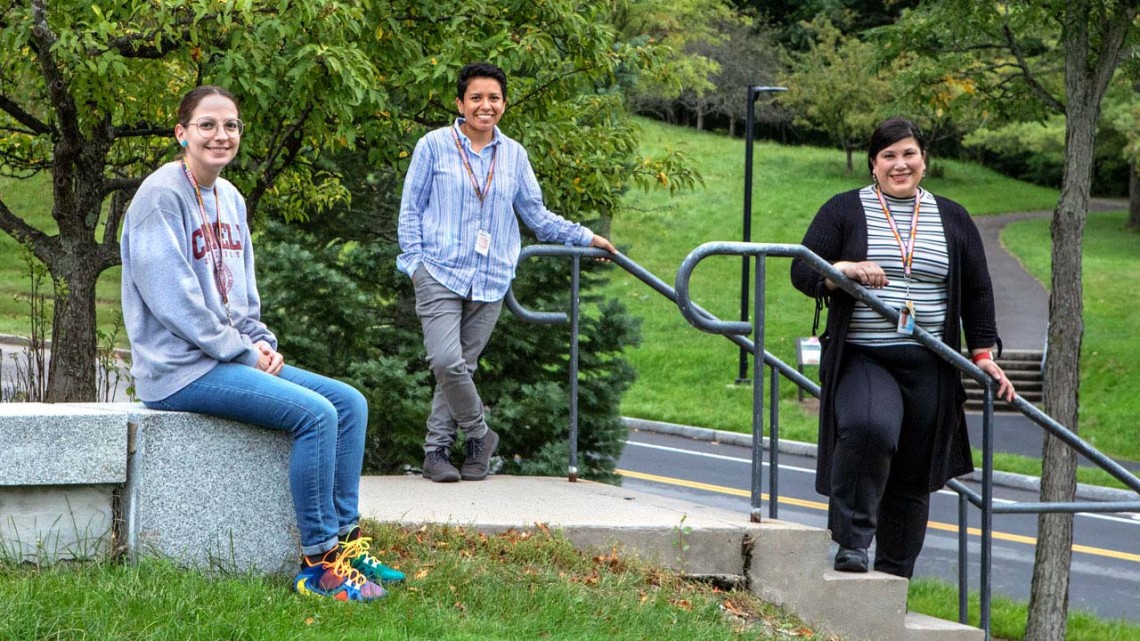
From left to right, René Plevyak, Ana Riley and Sandra Valdes-Lopez comprise the university’s new Community Response Team.
Community Response Team supports students in distress
By David Nutt
Students living on campus have a new resource for support when they are experiencing distress, with the launch of the university’s Community Response Team (CRT) at the start of this semester.
As part of the Division of Student and Campus Life, the team provides assistance to students in crisis in on-campus residential communities during evenings and nights, 7 p.m. to 4 a.m., Wednesday through Saturday.
“The Community Response Team supports individuals and communities in moments of crisis or distress that do not need a law enforcement response. The presence of community responders allows us to intervene and offer care, while also reducing police response to situations that are not criminal or violent in nature,” said Marla Love, the Robert W. and Elizabeth C. Staley Interim Dean of Students. “This intermediary response structure creates another level of staffing to assist the efforts of residence life staff in supporting the well-being of our students.”
The need for such a team emerged in summer 2020 when President Martha E. Pollack called for evaluating and reimagining the university’s safety and security protocols following the widespread national protests of the killing of George Floyd.
That need was echoed by Cornell’s Public Safety Advisory Committee, which recommended the university implement an alternative public safety and response model.
An increasing number of universities and community agencies are finding alternative ways to respond to campus incidents without having to use law enforcement.
The two-year pilot program is comprised of three community responders with extensive experience in crisis management, victim advocacy and trauma-informed care (with one more position soon to be filled). Onboarding and training for the community responders began in the spring, and the team formally launched during the first week of classes.
The CRT’s coverage area includes university owned and occupied residences on North and West campuses, including cooperative houses, community centers and the 10 university-owned Greek houses.
“When it comes to the types of situations in which CRT will provide support, nothing, be it physical, mental or spiritual, is too small,” said Reba McCutcheon, associate dean of students, who oversees the team. “Part of the community responders’ role is to help students get connected with the appropriate resource and can also serve as confidential resources for incidences of sexual assault or misconduct as defined by Policy 6.4.”
Students can contact CRT by calling its hotline at (607) 253-2100 during shift hours. During other times, calls will be automatically forwarded to Cornell Police Dispatch Center to ensure that some form of university support is available. Drop-ins at the CRT “hub,” located at 103 Appel Commons Community Center, are also welcome.
“We feel honored to be a part of reframing how we respond to the many needs of Cornell’s students as we build this program from the ground up,” said community responder René Plevyak.
Unlike traditional first responders, CRT team members are able to spend extra time with students and schedule follow-up meetings and check-ins. If a student is unable to attend class or take an exam, CRT can contact the student’s college or professor, or work with the Care and Crisis Services team within the Office of the Dean of Students to provide further support.
In many cases, such as those requiring ambulance transport, Cornell University Police and Cornell Environment Health and Safety’s Emergency Services are required to respond as well. Depending on the circumstances, a different agency may take the lead while others wait on standby. Strong collaboration is important among the agencies in the campus’ larger system of care, McCutcheon said.
Throughout the semester, CRT is conducting an outreach tour of campus, with meet-and-greet and listening sessions at residence halls and cooperative houses.
“We continue to shape this new program to understand the needs and concerns of our students as they live and learn in our residential communities,” Love said. “Together we are reimagining public safety for Cornell.”
Get Cornell news delivered right to your inbox.
Subscribe
